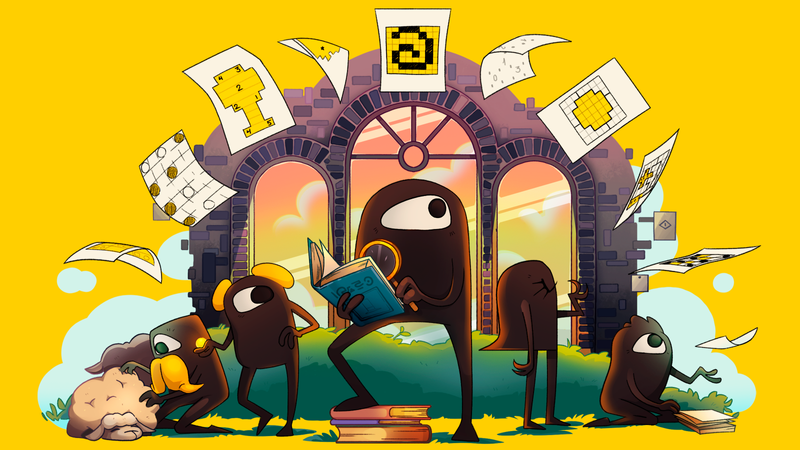Puzzling isn't exactly a hallmark of twin-stick shooters; their frantic tempo and high reactivity demand lends itself poorly to acts of logical deduction. Indeed, it's difficult to think of two video game genres that are more diametrically opposed. Even first-person shooters require players to solve the odd maze now and again.
This makes Moonloop Games' Hauntii all the more remarkable, a twin-stick shooter that's as much about solving the mysteries of its world as it is blasting the enemies inside it. Hauntii already stands out thanks to its distinctive art style and incredible soundtrack. But what makes it special is how deftly it straddles two of gaming's most polarised genres.
Hauntii puts players in the role of a ghost freshly arrived on the shores of the afterlife, searching for an elusive angelic figure known as an Empyrean, while also seeking to unlock memories of their corporeal past. Yet while Hauntii's themes are highly emotive, the origins of its story are far more practical. "It sounds so stupid, but the original reason it's about ghosts is because I didn't want to animate arms and legs," says Leo Dasso founder of Moonloop Games. "A ghost was like 'oh yeah, it's just a capsule.'"
Dasso has been designing games for the best part of two decades, starting out in middle-school making free Flash games published on Newgrounds.com. He studied illustration in college, while his programming skills are all self-taught, "learning through online tutorials and that kind of thing." As a professional game designer, Dasso's previous projects include the 2D shooter Ballpoint Universe, the undersea exploration game Diluvion, and the high-school-themed tactics RPG Wintermoor Tactics Club.
Hauntii was always intended to be a twin-stick shooter, but it was very different in its original form. "It was like a twin-stick shooter Warioware," Dasso says. "My idea was like twin-stick shooter minigames and it would just be rapid-fire." Dasso lost interest in this idea "pretty quickly", but picked up the project again with a slightly different angle: "What about a twin-stick shooter with a Mario Odyssey-like capture mechanic?"
Dasso almost lost interest in this too. Indeed, it was only when the Covid-19 pandemic struck – a whole year after the Mario Odyssey inspiration – that he started to take the idea seriously. "I think the combination of being in a new country plus the pandemic, it was a very isolating time," he says. "I kind of channelled that into Hauntii a bit."
Mario Odyssey inspired Hauntii in several ways. One of these was the idea of collecting stars, giving players impetus to explore Hauntii's ethereal realms. Odyssey's most significant influence, however, was the 'capture' mechanic, aka the ability to possess other objects in the game world. "The original prototype had a separate button that you would use to possess something, and it never felt right," Dasso says. "Playtesters were confused, and they always forgot about it." Consequently, Dasso decided to fold the shooting and the possession system together, so that shooting a "hauntable" object for a sustained period would ultimately cause players to take control of it.
Merging shooting and possession is also the key to how Hauntii brings together puzzling and twin-stick shooting. Dasso intentionally made Hauntii's basic "green glob" ammo very weak so players were encouraged to possess objects. Originally, this was meant for combat purposes "The intent was to steer players towards possessing something, or going off to find something to possess and then coming back to that with a more powerful upgrade," Dasso says. He admits that Hauntii "didn't always pull this off" and that some combat encounters are straight up fights. Nonetheless, this idea of exploring and going off the beaten path to find 'hauntables' opened up the possibility of including puzzles.
This was further influenced by Dasso's narrative aspirations for the game, which emerged as he delved deeper into the idea of venturing through the afterlife. "Hauntii is not structured per-se like a twin-stick shooter. It's actually structured more like an adventure, which was I think because we did have a narrative that we wanted to [tell] in Hauntii," Dasso says. "And having a strong narrative-driven thing, plus a hardcore twin-stick shooter, somehow it didn't mesh."
In this way, Hauntii's world became split into multiple realms, each comprised of a dozen or so openly explorable smaller areas. These areas helped Moonloop mediate Hauntii's pace, allowing puzzles and combat encounters to sit alongside one another. For example, in the game's opening forest realm, the player can possess ladybugs to climb trees and glide between them, accessing stars and other collectibles hidden in the forest canopy. "We were like 'there's all these trees, it would be cool if there was some vertical element," Dasso says. "The ladybug almost got cut, and I'm so glad it didn't."
In addition, each realm has a different theme, ranging from forests to deserts to a colossal afterlife carnival. Each of these brought with it new ideas for interactable objects, which in turn led to new ideas for puzzles. The carnival realm, for example, includes vast, looping rollercoasters that double as puzzling objects and a mode of fast travel for the area. Meanwhile, the desert realm (known in-game as the Void) includes vast maze-like structures that can be possessed and lifted out of the sand, with the player then teleporting onto the structure to tackle the maze itself. "I wish we had a little bit better feedback on when you approach an edge, because due to the color scheme of the game, there are some areas where it's not super clear [if you're] going to walk off," Dasso says. "We've had a few player feedbacks about that."
Hauntii released in May this year, during a particularly busy period for the indie market. Its blend of exploring, puzzle-solving and twin-stick shooting led it to review well, although Dasso describes the release period as "rough", due to issues with the Nintendo Switch version of the game. Moreover, there's a sense Hauntii isn't the commercial success it deserves to be, having been somewhat jostled aside in an increasingly crowded release schedule. "I'm really, really hoping that this is a game that people keep finding, because a lot of people who play through to the end and they see the ending, they message us on Discord and they're like, 'oh my god, I love the ending'," Dasso concludes. "And I think people who have that good experience are likely to tell their friends."
Nonetheless, Moonloop is still working on Hauntii, updating the game on Steam, and has plans for future events, such as a Hallowe'en event, that he hopes will encourage more people to explore "I'm just hoping that we can keep reaching new players and improve the game where we can," Dasso says. Truly though, Hauntii should not need to further persuade players to try it. It's already an elegantly made adventure that, through its blend of twin-stick shooting and puzzling, achieves something quietly extraordinary.







